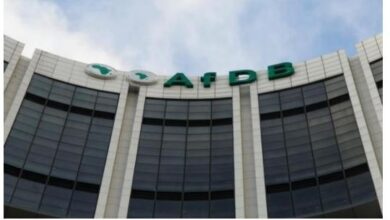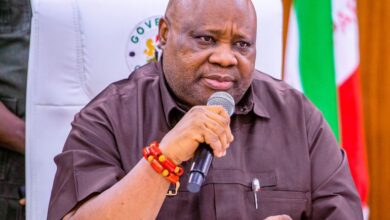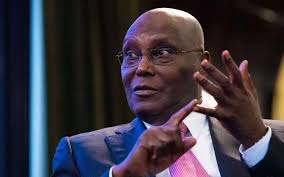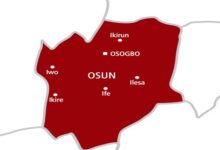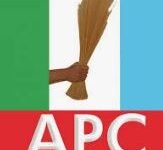INEC Electoral Fraud With Traceable Footprints
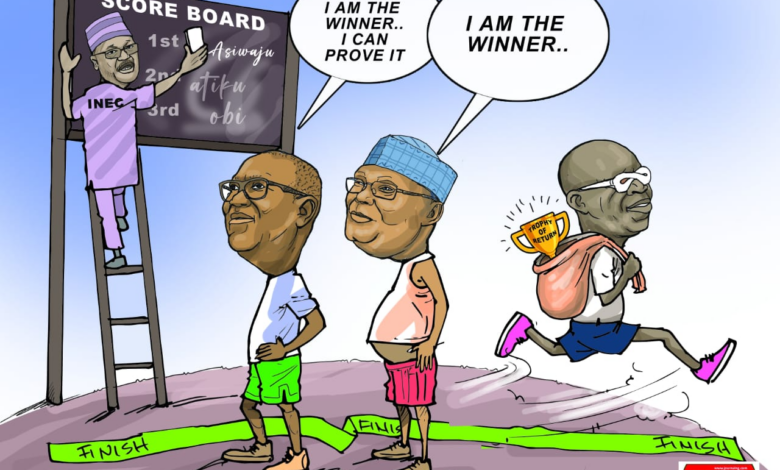
Nigeria”s electoral umpire has conducted the first round of 2023 elections defying it’s guidelines and conferring a controversial victory on the ruling APC
Barely four days after declaring Bola Ahmed Tinubu winner of the presidential election, the Independent National Electoral Commission (INEC) has in it’s own result viewing portal uploaded figures contradicting earlier numbers on which victory was awarded.
This has placed bold question marks on the integrity of the commission that failed to upload polling unit results online, in real-time using the Biometric Voters Accreditation System(BVAS) as earlier promised.
SOME Nigerians have questioned t
Aside from the proven cases of voter intimidation, assault, and suppression which security agencies were unable to completely tackle in states like Lagos, Kano, and Rivers, the umpire failed to take its BVAS machine to about 5 polling units in Maiduguri, Borno State where the opposition were believed to enjoy support.
Results being uploaded on the IRev platform have started proving the probable integrity of earlier figures on which Tinubu and other elected federal lawmakers were declared winners.
The credibility of Presidential Election results uploaded on the Independent National Electoral Commission (INEC) Result Viewing portal (IReV).
Many Nigerians are currently glued to the portal, trying to track the uploaded Presidential Election results.
As at Sunday, March 5, 2023 INEC has so far uploaded 161,624 results from 176, 846 polling units, eight days after the presidential poll, which is adjudged too slow and at variance with promises made by Prof. Mahmood Yakubu, the INEC Chairman.
Despite modern technology being deployed in many parts of the process, from voter registration to voter accreditation and results management, the Independent National Electoral Commission (INEC) faces mounting criticism over delays in the counting of votes and discrepancies in the results of the polls, including allegations of manipulation and fraud masterminded by politicians and their supporters.
It is widely held that all four leading parties – APC, LP, People’s Democratic Party(PDP), and New Nigeria People’s Party (NNPP) rigged in their areas of dominance with each accusing all others of perpetrating fraud.
While in Lagos, parts of South East and north there were reported cases of voter intimidation and suspected manipulation of figures by INEC officials in connivance with politicians, Kano was spotted for having child voters.
The figures used were gotten from Only the result sheets that were uploaded to the INEC’s IREV-Portal; and that means, the only source of the data used is from the INEC’s IREV-Portal Alone, and no other sources.
Even though there are some of the original results from the Polling-units which were totally different from those that were uploaded into the INEC’s IREV-Portal (which were also very “clean and untampered”; officials still had to use those IREV-Uploaded results sheets like that, and assumed that they were the “correct original result-sheets” from the Polling-units.
As officially announced by the INEC for the presidential election in Obio-Akpor LGA, in Rivers State,APC scored 80,239 while the Labour Party had 3,829. From the re-collated IREV-Portal Results , same Obio-Akpor LGA in Rivers State showed APC scoring 12,547 and LP having 70,186.
Though local and international observers differ on the integrity of the election, the voices faulting the process and outcome are more.
The European Union Election Observer Mission (EU EOM) on Monday raised questions about the transparency of the elections in Nigeria.
In its preliminary report, EU EOM Chief Observer, Barry Andrews, said although INEC held the elections on schedule, the process was characterised by a lack of transparency.
“Overall, stakeholders had expressed confidence in INEC’s independence, professionalism, and voter information efforts, but this decreased ahead of elections. INEC lacked efficient planning and transparency during critical stages of the electoral process, while on election day trust in INEC was seen to further reduce due to delayed polling processes and information gaps related to much-anticipated access to results on its Results Viewing Portal (IReV),” he said.
Mr Andrews said their findings showed election day was marked by late deployment and opening while polling procedures were not always followed.
Additionally, polling staff in the polling units they observed struggled to complete result forms, which were later not posted online.
He said despite introducing the Bimodal Voter Accreditation System (BVAS) and the INEC Results Viewing Portal (IReV) to ensure the credibility of the polls, uploading the results using the BVAS did not work as expected, raising concerns.
While revving up their machinery for litigation to reclaim the mandate of victory from APC, the PDP has embarked on protest to INEC office while LP seems to be collating evidence for a long legal walk.
For the first time in the country’s electoral history, three political parties are laying claim to one victory. It will now be time for judges to cast their votes – the final votes
Judicial Intervention as Extension of 2023 Elections.
By Dakuku Peterside
The last presidential and National Assembly election was as crucial to our democracy as it was controversial. A lot was riding on it, delivering more drama than anticipated. Our present reality is that going by the posturing of key political gladiators, the 2023 presidential and National Assembly elections have triggered direct judicial intervention as the final phase of the electoral process. This is fine. At least, it is the only legitimate channel to address grievances against the conduct of the elections and to seek redress.
Two major political parties, PDP and LP presidential candidates have made it clear they are approaching the courts to “correct what was not properly done” on 25th February. Apart from the two presidential candidates, many National Assembly candidates have also indicated an interest in approaching the courts. Without claiming to be a prophet, the number of cases may be less than we had in 2019 because of the dwindling faith of contestants in the judiciary among other reasons, but the issues will be more contentious this time
These issues range from constitutional and electoral acts interpretations, malfeasance, and criminal disruptions of polling processes which have made some question the validity of the electoral outcome.
The assumption, based on INEC narratives, before the elections was that we would have few reasons to drag the judiciary into the simple constitutional exercise of the people electing our Leaders. This hypothesis has turned out to be incorrect.
Avoidable slips by INEC created these triggers for the option of judicial intervention. What is worrisome is not that political gladiators are approaching the court to help fix our electoral process and may help us “choose” our political leaders but that this will put our judiciary on edge. This is a Judiciary that, objectively speaking, cannot claim it is enjoying the best public standing before Nigerians. In an environment suffused with corruption, even in the judiciary, the democratic process is at risk if it must depend on judicial outcomes to determine the validity of electoral processes.
One way to bring down democracy in any society or country is to have a compromised, incompetent, pusillanimous, and politically exposed judiciary. This invariably gives citizens only one option- self-help – the most common denominator for crisis and chaos for nations. Examples abound where the collapse of proper constitutional processes yields failed states. Therefore, we will focus on the judiciary in the next few weeks to stabilize and salvage our democracy.
Aside from the alleged malpractices during the elections, a few constitutional issues are at stake in this last election. Prominent among them is the contentious issue of 25 percent of votes cast in the Federal Capital Territory( FCT) as part of the requirements to be declared winner of a presidential election and the position of the law on electronic upload and transmission of election results at the polling unit/booth level. The court will interpret these laws and establish whether INEC or any candidate or party breaks them. The court also must adjudicate on the claims filed by these candidates, which are in three broad categorizations: 1) Allegations of a “stolen mandate” in which other candidates claim that they won the elections based on their own collated results from the polling units by their agents and must be declared winners by the courts. 2) The candidates may be calling for cancellations of the election. 3) The court maintains the status quo and allows the president-elect and winner of the last presidential elections to lead Nigeria because the opposition could not prove their case, or the level of infractions is insufficient to have changed the outcome of the election.
The national elections is technically over and the battle for consolidation of democracy has shifted to the courts. The judiciary must take all necessary steps to shield itself from being brushed by the tar of politics. Leaders of the bench must admit that they need much work to regain its reputation in the minds of Nigerians. No love is lost between Nigerians and judicial intervention in politics due to some judgments related to past political contests. The crisis of credibility afflicting the judiciary is evident to all and has taken a severe toll on the institution. It is trite to say that over time, the Nigerian court has not lived up to a decent reputation in most such electoral cum political cases.
The impartiality of the courts and its principled stand on key politically related constitutional cum electoral issues should not leave anyone in doubt about the courage to do justice. The belief in the judiciary as the ultimate sanctuary of justice in a democracy is founded on the supposition that judges will be above reproach.
Never in the history of Nigeria has the apex court canceled, nullified, or changed the outcome of a presidential election. We assume that it was because no such cases of presidential elections before the Supreme Court have convinced it that there was a prima facia justification for such.
However, we have a precedent in Africa of such cancellation. In the 2017 Kenyan presidential polls, the Supreme Court annulled the presidential election result, citing irregularities and that the election had not been “conducted in accordance with the constitution”. This judgment was a landmark one and was reached to save democracy in Kenya.
Admittedly, in a democracy, nobody can underestimate the judiciary’s role in correcting malfeasance. Advisedly, the court must allow technical issues to take the back seat and allow substantial justice to prevail. That is the only way we can correct a dysfunctional system and win the trust of Nigerians. This point is vital because in essential cases that attract the attention of the nation and citizens eagerly waiting for justice to be served, it is difficult for everyone to understand why legal technicalities will be the basis of judgments instead of the substance of the law. Only lawyers understand these technicalities, and decisions based on them are often difficult to sell to the public.
Communicating judicial pronouncements to the lay audience has been the bane of judicial reporting in Nigeria and is one of the major causes of public distrust of the judiciary in recent times. These presidential election cases allow the court to show its power and clear separation from the executive and legislature. Their job is to uphold the constitution and the rule of law and not essentially a substitute for the collective will of the people expressed through their votes. Any judicial decisions of the Supreme Court are final and can only be changed by itself or God. Therefore, the Supreme Court judges must be circumspect and convinced in their choices based on the laws and constitution of Nigeria from where it derives its powers.
It may be convenient for electoral disputes at sub-national and sub-sovereign levels to be determined by judicial processes, as we have seen in cases where the Supreme Court has altered the destinies of governors and states. It is common and understandable that at this level, whatever decisions the Supreme Court makes may not undermine the State so much given that the States are intertwined and linked with the federal and, as such, can withstand the sudden change of governors by the Supreme Court. But at the apex national level, the presidency, for example, purely technical and legal arguments may not suffice. Judicial decisions come to be conditioned by higher considerations of jurisprudence, national interest, and national security. At that level, judges of the Supreme Court must protect the Nigerian State and its sovereign security over and above matters of justice concerning the rights of individual contestants for partisan pre-eminence. There must be a nation before partisan contestants acquire the right to win an election. Nigeria cannot afford to pour out dirty water with the baby. Nigeria’s existence and growth far outweigh the issue of who leads it. We must always remember that there will be another election in four years if Nigeria survives the furor caused by the last election.
It is a pity that after all the plans, provisions of the electoral act that was greeted with fanfare by all Nigerians, and the promises of INEC to conduct a free and fair election in 2023 because of the BVAS and IREV provisions, we are still going to depend on the judiciary to determine the validity or otherwise of the polls. We will all admit that BVAS worked and contributed to more transparency and likely reduced disputation of electoral outcomes, especially in the national assembly polls. We must do a post-mortem of the election and learn from it to improve subsequent polls.
And the Supreme Court and the judiciary must be conscious that all eyes in and outside the country are on them. They are carrying the hope of a nation and must not dash that hope.
We look forward to a new Nigeria where judicial incursion into politics will be minimal, if not completely eradicated.
Joshua Okoria is a Lagos-based multi-skilled journalist covering the maritime industry. His ICT and graphic design skills make him a resourceful person in any modern newsroom. He read mass communication at the Olabisi Onabanjo University and has sharpened his knowledge in media practice from several other short courses

